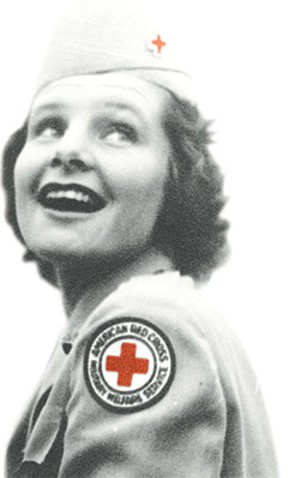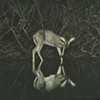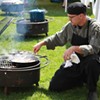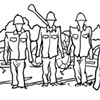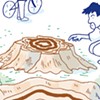Published March 25, 2009 at 8:52 a.m.
After shows at Burlington’s Flynn Center, there’s almost always a shuttle bus idling out front. With an elegant, maroon-lettered logo, the vehicle waits to pick up a brace of lively, well-dressed seniors. They are culture-savvy residents of Wake Robin, Vermont’s most exclusive “continuing-care” retirement community. A total of 320 affluent elders populate the hilltop enclave overlooking Lake Champlain, just south of the Shelburne Museum.
But for all the comforts they now enjoy — onsite dining, artistic programs, wood shop, indoor pool — the residents of Wake Robin have not forgotten the sacrifice and hardship that defined their generation. World War II touched almost every single one of them and forged a common bond.
The proof is in Our Great War, recently published by the Wake Robin Residents’ Association. Four community members with extensive editing and publishing backgrounds spent two years gathering first-person accounts of WWII experiences from 65 of their neighbors. They solicited contributions, took oral histories from those unable to pen their own, collected historical photos — and edited, proofread and polished every tale in the book. The result is a collection of stories both matter-of-fact and remarkable. Encompassing everything from grueling battlefield details to amusing home-front anecdotes, the anthology paints a picture of everyday life in a world convulsed by war.
The initial idea for the project began with Louise Ransom, now 87, who edited the Williston Whistle newspaper for a decade. “As I looked around, I realized that practically everybody in this building had a World War II story,” she remembers. “So it seemed very important to me that we recovered [them] while they still could be ... Because I am a writer and a journalist, it was haunting me.”
A deeply personal loss haunted Ransom as well. Before her husband died, he burned all but one of his wartime letters home to her, which she had carefully saved. “He told me they were too personal and he didn’t want them kicking around. And I think that’s why I got so obsessed about other people’s stories,” she reflects. Ransom’s own account is among those in the finished volume.
Seven Days sat down with Ransom and a dozen other contributors — now ranging in age from 78 to 94 — to talk about the process of looking back. Colorful stories that didn’t make it into print emerged during the interviews, along with a range of powerful emotions triggered by examining the experiences from so long ago.
******
Almost 70 years have elapsed since Adolf Hitler’s September 1939 invasion of Poland. For most of the Great War authors, penning the essay for the collection was their first attempt to write about what happened. Many haven’t talked much about the war, either, even with their own children. The process of sorting through memories and putting them on paper was difficult for some and delightful for others.
Vivid details course through the accounts in Our Great War. “Sometimes you’ve buried things, and you are surprised when they come back,” Ransom notes.
James McKay, 91, frankly admits that he has “pretty much dodged talking about” the war his whole life. He served as an Army battalion surgeon — the primary care doctor for several hundred frontline soldiers — during the Battle of the Bulge and the Allies’ subsequent final push through Germany in 1945. “I guess I’d been trying to forget the bad parts,” he explains. His raw account includes graphic, unsparing examples of war’s horror.
Four decades ago, McKay had his first experience reliving battlefield memories. “I always dodged war movies,” he recalls. “But in 1968, I went to the movie Patton with my then-wife. And about three-quarters of the way through it ... I had all the symptoms of a heart attack.” He went straight to the ER. “They all took one look at me and ran for the EKG machine,” he continues. His cardiac function was fine. “Apparently, it was a minor attack of post-traumatic stress disorder.” He hasn’t seen a war movie since.
During the interview, McKay is gracious and thoughtful. But he demurs on some questions that still seem too painful to answer. His essay in Our Great War concludes: “I left the Army with a profoundly cynical view of human character, behavior, claims, perceptions, and religions, which persists to this day.” He adds that his experiences made him “more objective,” especially about human frailty, which helped him in his career as a physician.
In the interview, McKay notes that time has mellowed his perspective on some of the inhumane things that happened. He seems satisfied to have finally told his tale. “I think that over the years we became ready to talk about it, and this book is a reflection of that,” he remarks. He just sent a copy to a nephew who had first begun pestering him for stories — unsuccessfully — as an 8-year-old in 1946.
For Barbara Dunnington, 94, the writing process was not painful but rather an act of tribute to the patients she worked with in a Pennsylvania rehabilitation hospital for severely wounded soldiers. As a lifelong pacifist, she volunteered after Pearl Harbor to serve in the Red Cross and did recreational therapy with disabled vets. “They were just marvelous people, who had been through the worst kinds of things,” she explains.
Dunnington’s eyes glisten as she recalls a group of men with detached retinas who had wanted to open a ski center after the war. Today the condition is treatable, but then it meant permanent blindness. “You weren’t supposed to get close to these people, but you couldn’t help but remember certain ones,” she says softly, the distress still evident in her voice.
Dunnington downplays her part in the war effort, as do all of the contributors to Our Great War, in both their essays and their interviews. Everyone served and sacrificed willingly, and no one applies the word “heroic” to his or her own work. The contrast with today’s “every-child-gets-a-trophy” mentality is striking.
Dunnington’s expression lights up, however, when she recounts how a group of patients showed her their appreciation — with a trophy! The grateful vets bought a secondhand yachting award at an auction and had it engraved with her name. She displays it proudly along with the tennis prizes she has earned over the years. Friends do a double take at both the sport and date on the “fake” trophy. “It was darling — 1911,” she recalls with a laugh. She’s old now, but not that old.
When Tad Kowalski, 86, looks back at WWII, he is bewildered by the actions of “a crazy kid.” He was 17 when German tanks rolled into his Polish hometown. “There wasn’t much time for thinking,” he recalls, which forced him to make decisions “without balancing the dangers and the possibilities.” After the Nazis shut down Polish high schools because “subservient races” didn’t need education, the teen obtained his parents’ permission to flee. He began a harrowing journey on foot and trains across Poland, Slovakia and Hungary, and eventually to France, England and Scotland.
“Did I do all that? Now, 70 years later, I wouldn’t dare,” Kowalski reflects, a look of wonder on his face. “I wouldn’t have taken risks like that. At times, when I was writing certain parts of it, it was almost like a shiver down my spine. Why would I do a thing like that?”
His greatest peril came escaping internment in the Hungarian countryside. He hopped a train to Budapest, carrying the address of the Polish consulate, where he would be able to obtain an exit visa to France. Two Good Samaritans may have saved his life. A train station employee slipped him past a guard, and then handed him off to a Hungarian soldier, who walked the teen wordlessly to the consulate’s front door in the middle of the night.
“I have often thought about this entire episode, how a complete stranger noticed a boy in need of help and came to his aid without thought of recompense,” Kowalski writes about his anonymous rescuers. “Did he ever consider this act might have determined the boy’s entire future? ... What if I had not been helped by these total strangers, and instead been picked up by the police and sent back to the internment camp? What then?”
******
Kowalski is one of many contributors who marvels that a twist of fate changed the outcome of his war experience. When carrier pilot Richard Austin, 87, accidentally disengaged the seat belt while practicing aerial loops, the tops of his fur-lined boots caught the edge of his seat and prevented him from being ejected from the plane. Naval officer Richard Ketchum, 87, recalls watching as a torpedo came straight at his vessel during a training run. Only the boat’s shallow draft saved the crew; the weapon “went right under us,” he says.
The humanity that Kowalski witnessed amid the savagery of war is another theme that echoes throughout Our Great War. McKay, the doctor, devised a clever form of frontline R&R, in which officers pampered enlisted soldiers on the verge of breaking down. Ruth Barrett, 85, who worked for international aid agencies on Europe’s postwar reconstruction, witnessed an amazing act of clemency — for a fresco — in Italy’s otherwise devastated countryside.
In the tiny hill town of San Sepulchro, Barrett explains, “We were told that all sides — all the planes — were warned not to bomb that spot. And even the Germans leaving, they left it covered with sandbags. Even in the midst of all the troubles, there was this kind of awe about a work of art that was very, very striking.” The ceiling-to-floor Resurrection scene survived intact.
Women participated as actively in the war effort as men did. “The question of whether you were male or female was not a factor,” Barrett says frankly. “There were things to be done, and if you were available, why, you did it.”
This included uniformed military service, which Marianna Grimes, 85, chose. “I didn’t join till I was 20, because that was the minimum age for women in the WAVES,” she recalls. And why did Grimes opt for the women’s branch of the Navy? “When I went to enlist, I went down a hallway. There was an office for the Army, an office for Marines, and the Navy. And I thought I would look better in navy blue,” she says with a smile.
Eagerness to serve, whether on the home front or overseas, comes through strongly from the contributors. “Pearl Harbor really touched a nerve in all Americans,” relates pilot Austin. “And so I didn’t have any hesitation — I couldn’t get in soon enough. And I noticed the whole country turned out with the same resolve to get at it.”
There was a “terrible urge to get into the fighting,” says Hervie Haufler, 89, who worked as a code breaker in England. “There was a war that had to be fought.” His wife Pat Haufler, 84, then a Middlebury College student, rolled bandages, gave blood and picked apples in Champlain Valley orchards that were short of farm labor. “It was the thing to do,” she says simply. “You wanted to do it. You didn’t do it and feel you were being noble or anything else.”
The stories in Our Great War encompass just the years of each contributor’s war service. But the editors add brief tags at the end of each essay summarizing decades of accomplishment that followed. McKay chaired the University of Vermont Medical School’s pediatrics department for more than 30 years. Kowalski had a distinguished engineering career in Canada and the United States. Both Barrett and Grimes worked for the United Nations’ UNESCO agency for nearly three decades. Ketchum and Haufler became writers — the latter penned two books about American code-breaking efforts during WWII as soon as secrecy provisions were lifted.
With America once again engulfed in deeply troubled times, do these dynamic seniors believe younger generations have the capacity for genuine sacrifice?
Tenth Mountain Division vet Gordon Lowe, 88, thinks the privations of the Great Depression shaped his generation’s collective character. “Young folks don’t have the background that we’ve had: shoveling the snow, and digging, and mowing lawns,” he describes. “We had to do it in our era to make up your pennies so we could buy something else. They live a whole different lifestyle now.”
Most of the Wake Robin residents express hope, or at least cautious optimism, that younger Americans will find a way to meet today’s challenges. Claire Kowalski, 78, who experienced rationing as a child in Québec City, married Tad after the war when they met at McGill University in Montréal. “I’m not sure how many of us human beings anywhere do a thing until we have to do it,” she muses. “I had often wondered, as my children were growing up, without being touched by war hardships as their father was ... how they would measure up if hardship came.”
“Today, there’s a depression, likely to go on for a while longer. And there are many people who are suffering intensely,” Claire continues. “I don’t think we know how we measure up until we have to do something. And then some of us sink and some of us swim.” With its tales of 65 strong swimmers, Our Great War offers inspiration for navigating rough waters.
Our Great War Excerpts
Richard Austin on a mission in the South China Sea
“On the same mission, one of our fighter planes was struck by anti-aircraft fire. The pilot was stunned temporarily but remained conscious and fully aware that he could not see. The plane was apparently flying itself, as best he could tell. His radio worked well and he called his section leader, informing him that he was injured, blind, and lost. The section leader broadcast to ‘all planes in the area’ to look for a lone F6F fighter flying erratically. Fortunately, another Air Group flying to the Saigon area spotted the pilot and directed the Section Leader to his location. The two then started back for the Yorktown, which was 150 miles away, guiding the blind pilot using radioed directions. The wounded pilot kept telling his section leader he felt faint, but with persuasion and encouraging chatter, they both made it back to the Fast Carrier Task Force.
… With extraordinary courage the Section Leader flew formation along with his wounded charge, told him when to lower wheels, flaps, hook, etc., and talked him down to the low altitude required for carrier landing. It required two approaches, but the wounded bird landed safely. The Flight Surgeon then jumped up on the wing of the plane and removed the fuse of an antiaircraft shell from the back of the pilot’s head with his fingers. The pilot recovered some vision, but never enough to fly again.”
James McKay, MD on the Battle of the Bulge
“We began to see battle fatigue from the physical strain and emotional tension of combat, combined with the associated lack of sleep and personal hygiene. As a method of handling the problem without sending afflicted soldiers back to the rear echelon for psychiatric care (which meant loss of a soldier’s services to his unit for a week or more, or sometimes permanently), I developed a form of ‘mini’ R&R ... hoping to avoid their dropping out of their units, as well as loss of self-respect and that of their comrades-in-arms. This involved assigning the affected soldier to ‘temporary duty’ in the medical detachment, a haircut done personally by me (having a Captain and a Doctor as one’s personal barber seemed a particularly good morale booster, especially for enlisted men), a shave (skillfully done by the medical detachment’s podiatrist), a warm bath or shower, a hot meal, and an undisturbed night of rest on a dry cot under warm blankets. The period of sleep usually lasted from 12 to 20 hours, and after a second meal, the soldier was generally ready and eager to return...
We moved about from bivouac to bivouac as the weather changed from overcast and foggy, which protected us from being strafed or bombed by the occasional German plane passing overhead, to cold and snowy. Nighttime patrols by the Germans occasionally awakened us when they were fired on. On one occasion several hours after the gunfire had stopped, we heard rustling sounds in the dark around our aid station tents. A couple of my men sneaked out cautiously to see what was going on. They returned in about 20 minutes, very upset, to say they had seen American GIs cutting off fingers of dead soldiers, both German and American, to steal wedding rings. This was our introduction to some of the brutality of war.”
Red Cross reflections from Barbara Dunnington
“During 1944 and 1945, I worked with a great many severely wounded veterans. They had endured unimaginable horrors, and all are unforgettable unsung heroes. One of the patients had survived the infamous Bataan Death March (Philippines) and the many months of inhumane treatment that followed ...He said memorably, ‘we endured without losing our humanity.’
...I well remember playing tennis with a tennis-loving veteran who had lost one arm. I also played golf with some blind veterans. In that instance, I would estimate the number of yards to the green, then go up ahead and rattle my club in the hole so they could judge the direction and distance. They often would kid me about my poor judging of distance accurately. Thank goodness a person’s sense of humor can transcend the worst of human tragedies. For these casualties of global warfare, it proved remarkable.
...Twenty years after the war, some of us were invited to attend the National Convention of Plastic Surgeons, a memorable event. I remember one very special volunteer from Philadelphia who during the war traveled every day from the city to assist both patients and doctors, and the unforgettable speech she made that night. She said what she learned from this experience was that ‘the human spirit can survive anything,’ and these casualties of war mostly did.”
Tad Kowalski on German troops in Poland
“There was a distinct difference in behavior of the first wave of German soldiers passing through Kutno, the frontline troops, and the army of occupation. The former were only interested in fighting the retreating Polish army, while the latter were more unruly and concentrated on subjugating the population without bothering with the niceties of international law. They would break into houses looking for valuables or liquor, beat up people with or without provocation, and maintain order through sheer terror. Under occupation, there were incidents when a German soldier would disappear and later be found killed. Immediately, soldiers would close off the area, arrest 20 to 40 passersby, line them up in the street, and execute them on the spot. No attempt was made at separating children, old people, or invalids. The terror was deliberate, and it worked.
A third group of occupiers were the Gestapo. Their role was to suppress any signs of resistance to the occupation by any method. They were unrestrained by laws or conventions. Their appearance in black uniforms with the skull and crossbones insignia instilled fear and foreboding. Gestapo operations have been well documented, but reading about them is not the same as living under the day-to-day terror of their presence.”
Our Great War: Memoirs of World War II from the Wake Robin Community, Shelburne, Vermont, edited by Louise Ransom, Donald Robinson, Ruth W. Page and Sherry Worrall. Wake Robin Residents’ Association, 356 pages, $19.95. Available at The Flying Pig Bookstore, Shelburne, and www.wakerobin.com.
More By This Author
Speaking of...
-

Pro-Palestinian Encampment at UVM Has Disbanded After 10 Days
May 8, 2024 -

Burlington City Council Rejects Pro-Palestine Ballot Item
Jan 23, 2024 -

Rep. Balint Reverses Course, Calls for Cease-Fire in Gaza
Nov 16, 2023 -

Protesters Disrupt Balint Fundraiser to Demand Cease-Fire in Gaza
Nov 9, 2023 -

Russian Photojournalist Dmitri Beliakov Brings His Images of War in Ukraine to Vermont
Feb 24, 2023 - More »
Comments
Comments are closed.
From 2014-2020, Seven Days allowed readers to comment on all stories posted on our website. While we've appreciated the suggestions and insights, right now Seven Days is prioritizing our core mission — producing high-quality, responsible local journalism — over moderating online debates between readers.
To criticize, correct or praise our reporting, please send us a letter to the editor or send us a tip. We’ll check it out and report the results.
Online comments may return when we have better tech tools for managing them. Thanks for reading.
































